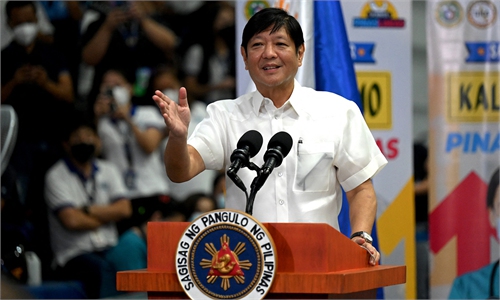Marcos’ visit makes China-Philippines ‘tension’ collapse on itself: Global Times editorial

Philippine President Ferdinand Marcos Jr delivers a speech during his visit to a vaccination site in Manila on August 1, 2022.Photo: AFP
At the invitation of Chinese President Xi Jinping, President of the Republic of the Philippines Ferdinand Romualdez Marcos Jr. began a three-day state visit to China on Tuesday. This is Marcos' first visit to China as president and his first official visit to a country outside the ASEAN. Moreover, Marcos will be the first foreign head of state to be hosted by China in 2023. It can be seen that both China and the Philippines attach great importance to bilateral relations. The so-called tension between China and the Philippines, created by Western public opinion not long ago, collapsed on itself. The hype without a factual basis eventually failed to take root.
"I will be opening a new chapter in our comprehensive strategic cooperation with China," Marcos said before departing for Beijing. The two countries are set to sign more than 10 key bilateral agreements. The Philippines side noted the two will establish a direct communication channel between their foreign ministries to avoid "miscalculation and miscommunication" in the disputed waters.
This reflects two themes. First, mutually beneficial and win-win cooperation between China and the Philippines will be continuously promoted, which is the locomotive and engine leading the development of bilateral relations. Second, divergences in the South China Sea will be managed and controlled, and will be prevented to become a stumbling block of pragmatic cooperation, or a fuse of a crisis that could undermine peace and stability in the South China Sea.
In recent years, China and the Philippines have been meeting each other half way on these two themes, achieved fruitful results and reached leapfrog development. On the South China Sea issue, both sides made a lot of communication with good intentions, and did not let it become an obstacle to bilateral relations. In the field of economy and trade, in recent years, China's cumulative approved investments in the Philippines quadrupled. The total trade volume between the two has also doubled. China has been the Philippines' largest trading partner, largest source of imports and second largest export market. The China-proposed Belt and Road Initiative is in deep cooperation with the Philippines' "Build, Build More" and "Build Better More" programs. The two sides have carried out nearly 40 intergovernmental cooperation projects in fields such as epidemic prevention, disaster relief, infrastructure and agriculture. China-Philippines relations are on a new starting point as Marcos began his China visit. Both Marcos and all walks of life in the Philippines have been paying great attention and looking forward to this visit, hoping the bilateral cooperation in various fields will be promoted to a higher level, and even set the tone for the bilateral ties in the next five to six years.
The US and Western public opinion are also keeping their eyes on the Marcos' visit, but obviously there is a clear difference between their focus and that of the Philippines. The West has been making noises, focusing on South China Sea disputes, which Marcos hopes to down play.
They tried to find "cracks" in the South China Sea issue and vigorously create and amplify the discord and controversy between China and the Philippines. They always mention Marcos' visit to China and China-Philippines cooperation with a sarcastic tone. Their efforts run counter to the interests and aspirations of the Philippines, but keep pace with Washington's actions of sowing discord in the South China Sea, which requires all regional countries, especially the Philippines, to maintain high vigilance.
When US Vice President Kamala Harris visited the Philippines in November last year, she deliberately traveled to Palawan, which is next to the Nansha Islands. When there was any slight sign of disturbance in the South China Sea, Washington immediately jumped out and said that the US will work with the Philippines to maintain the so-called "rules-based international order" and "the freedom of navigation in the South China Sea guaranteed by international law."
Washington's true intentions between the lines are already clearly revealed. It shows that the public opinion in the US and West and Washington's interests and positions on the South China Sea issue have fundamentally diverged from that of the Philippines and all South China Sea countries. Countries in the South China Sea, including the Philippines, have a relatively clear understanding of this. Marcos said that the Philippines adheres to independent diplomacy and will not choose sides. But for the Philippines and other countries in the region, it has always been a problem to soberly and wisely deal with the "coercion and temptation" from Washington.
It is worth mentioning that Marcos has a positive attitude toward China-Philippines joint development of offshore oil and gas. If his visit can promote the resumption of relevant negotiations between the two countries, it will be a significant progress.
In as early as 2005, China and the Philippines started discussions and negotiations on oil and gas cooperation in the South China Sea. However, due to the complicated influence of Philippine domestic politics and interference from the outside, the consultations and negotiations experienced difficulties, failed to achieve a breakthrough.
Although this is somewhat regrettable, China and the Philippines have already established some consensus, which is the basis for restarting the negotiations, and the setbacks in the past also provided important experiences for both sides. The joint development of oil and gas is a crucial step in building the South China Sea into a sea of peace, friendship and cooperation. We hope that Marcos' visit will bring new opportunities and usher in a new "golden age" of China-Philippines friendship.

